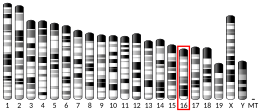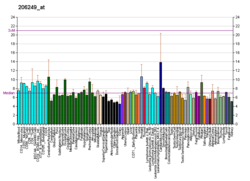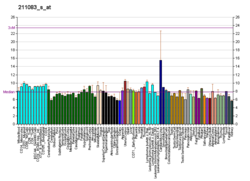MAP3K13
Appearance
Mitogen-activated protein kinase kinase kinase 13 is an enzyme that in humans is encoded by the MAP3K13 gene.[5][6]
Function
[edit]The protein encoded by this gene is a member of serine/threonine protein kinase family. This kinase contains a dual leucine-zipper motif, and has been shown to form dimers/oligomers through its leucine-zipper motif. This kinase can phosphorylate and activate MAPK8/JNK, MAP2K7/MKK7, which suggests a role in the JNK signaling pathway.[6]
Interactions
[edit]MAP3K13 has been shown to interact with PRDX3.[7]
References
[edit]- ^ a b c GRCh38: Ensembl release 89: ENSG00000073803 – Ensembl, May 2017
- ^ a b c GRCm38: Ensembl release 89: ENSMUSG00000033618 – Ensembl, May 2017
- ^ "Human PubMed Reference:". National Center for Biotechnology Information, U.S. National Library of Medicine.
- ^ "Mouse PubMed Reference:". National Center for Biotechnology Information, U.S. National Library of Medicine.
- ^ Sakuma H, Ikeda A, Oka S, Kozutsumi Y, Zanetta JP, Kawasaki T (Dec 1997). "Molecular cloning and functional expression of a cDNA encoding a new member of mixed lineage protein kinase from human brain". J Biol Chem. 272 (45): 28622–9. doi:10.1074/jbc.272.45.28622. PMID 9353328.
- ^ a b "Entrez Gene: MAP3K13 mitogen-activated protein kinase kinase kinase 13".
- ^ Masaki M, Ikeda A, Shiraki E, Oka S, Kawasaki T (Jan 2003). "Mixed lineage kinase LZK and antioxidant protein-1 activate NF-kappaB synergistically". Eur. J. Biochem. 270 (1): 76–83. doi:10.1046/j.1432-1033.2003.03363.x. PMID 12492477.
Further reading
[edit]- Masaki M, Ikeda A, Shiraki E, Oka S, Kawasaki T (2003). "Mixed lineage kinase LZK and antioxidant protein-1 activate NF-kappaB synergistically". Eur. J. Biochem. 270 (1): 76–83. doi:10.1046/j.1432-1033.2003.03363.x. PMID 12492477.
- Ikeda A, Sakuma H, Masaki M, Kozutsumi Y, Oka S, Inazawa J, Kawasaki T (2002). "Genomic organization and fine-mapping of the human leucine zipper-bearing kinase (LZK) gene". J. Biochem. Mol. Biol. Biophys. 6 (2): 113–7. doi:10.1080/10258140290027243. PMID 12186766.
- Ikeda A, Hasegawa K, Masaki M, Moriguchi T, Nishida E, Kozutsumi Y, Oka S, Kawasaki T (2002). "Mixed lineage kinase LZK forms a functional signaling complex with JIP-1, a scaffold protein of the c-Jun NH(2)-terminal kinase pathway". J. Biochem. 130 (6): 773–81. doi:10.1093/oxfordjournals.jbchem.a003048. PMID 11726277.
- Ikeda A, Masaki M, Kozutsumi Y, Oka S, Kawasaki T (2001). "Identification and characterization of functional domains in a mixed lineage kinase LZK". FEBS Lett. 488 (3): 190–5. doi:10.1016/S0014-5793(00)02432-7. PMID 11163770. S2CID 44379847.
- Schultz SJ, Nigg EA (1994). "Identification of 21 novel human protein kinases, including 3 members of a family related to the cell cycle regulator nimA of Aspergillus nidulans". Cell Growth Differ. 4 (10): 821–30. PMID 8274451.






